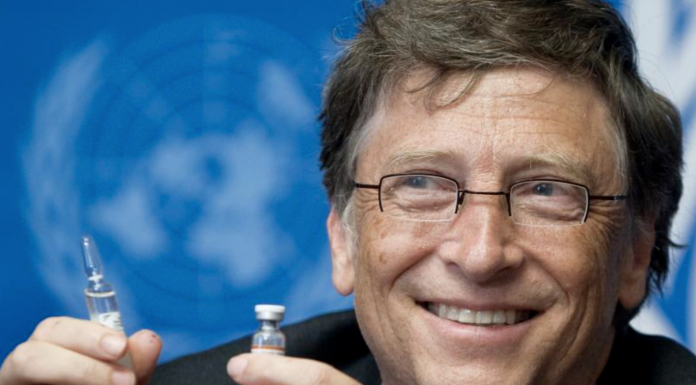DAILY BEAST – Bill Gates enjoyed holding court at Jeffrey Epstein’s Manhattan mansion, allegedly seeking refuge from his marriage and talking with the sex offender’s circle of high-profile dinner guests about philanthropy and other worldly topics.
But the Microsoft mogul may have been angling for another perk by networking with Epstein: Gates hoped the well-connected pervert could help him secure the Nobel Peace Prize, one former Gates Foundation employee told The Daily Beast.
This person said members of the foundation’s communications team were alerted to Gates’ relationship with Epstein and were told it “was a maneuver to try to get himself a Nobel Peace Prize.”
They said the tech mogul had even kept some employees on call on prize day in years past just in case he was awarded the distinction.
“We were aware of things that were potential reputational risks for the foundation and the co-chairs, Bill and Melinda,” said the former employee. “Even back then, people knew this guy wasn’t squeaky clean,” the person said, referring to Epstein.
“He thought that Jeffrey would be able to help him, that he would know the right people, or some kind of way to massage things, so he could get the Nobel Peace Prize.” — Former Gates Foundation employee
“He [Gates] thought that Jeffrey would be able to help him, that he would know the right people, or some kind of way to massage things, so he could get the Nobel Peace Prize, which is what Bill wants more than anything else in the world,” the staffer said.
“I think he was ultimately disappointed it didn’t work out,” the person added.
Epstein was known for cultivating a rolodex of elite contacts from around the globe: billionaires, royals, celebrities, politicians, and prominent scientists, including Nobel laureates Frank Wilczek, Gerald Edelman and Murray Gell-Mann.
The money-manager also opened various “nonprofits” over the years to steer millions to his friends’ projects and to fund research at institutions including the Massachusetts Institute of Technology and Harvard University. Researchers continued taking Epstein’s money despite widespread reports of his abuse of underage girls and young women.
The former staffer’s claim that Gates thought Epstein was his ticket to the prestigious prize adds fuel to a Norwegian newspaper’s report last year that highlighted a 2013 meeting with Gates, Epstein, and the Norwegian Nobel Committee’s chairman at the time, Thorbjørn Jagland … Click here to read more.
Nobel Peace Prize
From Wikipedia, the free encyclopedia
The Norwegian Nobel Committee awards the Nobel Peace Prize annually “to the person who shall have done the most or the best work for fraternity between nations, for the abolition or reduction of standing armies and for the holding and promotion of peace congresses”. As dictated by Nobel’s will, the award is administered by the Norwegian Nobel Committee and awarded by a committee of five people elected by the Parliament of Norway.
Each recipient receives a medal, a diploma, and a monetary award prize (that has varied throughout the years). It is one of the five prizes established by the 1895 will of Alfred Nobel (who died in 1896), awarded for outstanding contributions in chemistry, physics, literature, peace, and physiology or medicine.
List of Nobel Peace Prize laureates
2020 World Food Programme (founded 1961), United Nations, “for its efforts to combat hunger, for its contribution to bettering conditions for peace in conflict-affected areas and for acting as a driving force in efforts to prevent the use of hunger as a weapon of war and conflict.”
2019 Abiy Ahmed (born 1976), Ethiopia, “for his efforts to achieve peace and international cooperation, and in particular for his decisive initiative to resolve the border conflict with neighbouring Eritrea.”
2018 Denis Mukwege (born 1955), Democratic Republic of the Congo, “for their efforts to end the use of sexual violence as a weapon of war and armed conflict.”
2018 Nadia Murad (born 1993), Iraq “for their efforts to end the use of sexual violence as a weapon of war and armed conflict.”
2017 International Campaign to Abolish Nuclear Weapons (founded 2007), Switzerland, “for its work to draw attention to the catastrophic humanitarian consequences of any use of nuclear weapons and for its ground-breaking efforts to achieve a treaty-based prohibition of such weapons.”
2016 Juan Manuel Santos (born 1951), Colombia, “for his resolute efforts to bring the country’s more than 50-year-long civil war to an end, a war that has cost the lives of at least 220,000 Colombians and displaced close to six million people.”
2015 Tunisian National Dialogue Quartet (2013–2014), Tunisia, “for its decisive contribution to the building of a pluralistic democracy in Tunisia in the wake of the Jasmine Revolution of 2011.”
2014 Kailash Satyarthi (born 1954), India “for their struggle against the suppression of children and young people and for the right of all children to education.”
2014 Malala Yousafzai (born 1997), Pakistan, “for their struggle against the suppression of children and young people and for the right of all children to education.”
2013 Organisation for the Prohibition of Chemical Weapons (founded 1997), Netherlands, “for its extensive efforts to eliminate chemical weapons.”
2012 European Union (founded 1958), “for over six decades contributed to the advancement of peace and reconciliation, democracy and human rights in Europe.”
2011 Ellen Johnson Sirleaf (born 1938), Liberia, “for their non-violent struggle for the safety of women and for women’s rights to full participation in peace-building work.”
2011 Leymah Gbowee (cropped).jpg Leymah Gbowee (born 1972) Liberia “for their non-violent struggle for the safety of women and for women’s rights to full participation in peace-building work.”
2011 Tawakkol Karman (born 1979), Yemen, “for their non-violent struggle for the safety of women and for women’s rights to full participation in peace-building work.”
2010 Liu Xiaobo (1955–2017), China “for his long and non-violent struggle for fundamental human rights in China.”
2009 Barack Obama (born 1961), United States, “for his extraordinary efforts to strengthen international diplomacy and cooperation between peoples.”
See the full list here.



